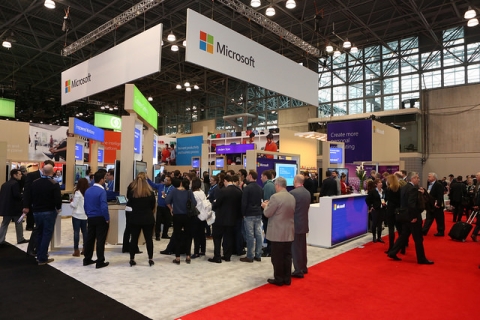Experts Share their Event Digital Toolkit in IAEE Webinar

By Elizabeth Johnson
Recent research from Center for Exhibition Industry Research (CEIR) uncovered that just seven percent of exhibition organizers and 12 percent of exhibitors rate their digital offerings as effective in enhancing the attendee experience. Given the shared confidence level is so low, the October International Association of Exhibitions and Events (IAEE) webinar, “Using Digital to Rock Your Attendees’ Trade Show Experience” is certainly timely.
During the hour-long webinar, Nancy Drapeau, PRC, director of research, CEIR, moderated a panel of experts; David Saef, CTSM, executive vice president, MarketWorks; GES; Bill McGlade, CEM, director of account management, a2zInc; and Aidan Augustin, co-founder, Feathr, who described a toolkit of digital tactics to use before, during and after an event.
Drapeau reviewed results from the study to demonstrate how digital tools are necessary to make logistics easier and add value while preserving the essence of events, face-to-face interaction. She noted that event’s website is its most important digital asset according to attendees, following by search and email.
Augustin offered insights into preshow planning.
“People are spending an absurd amount of time online and that’s where you should find them,” he commented. “Across your digital assets you have your audiences. Invest in that sort of engagement.”
He suggested event organizers use analytics tools such as Google Analytics, Kissmetrics, or Mixpanel to make changes as well as monetize their digital assets. Examples of monetizing digital assets include in-app sponsor placement or sponsored push notifications and social media shout outs.
Augustin also discussed ad retargeting and using email mapping and other digital tools to segment their ad campaigns based on their audience’s activities. He added that event organizers could start a new revenue stream by offering sponsored retargeting, where they place online or social ads to their digital audiences (for example, website visitors) on behalf of the sponsor.
McGlade emphasized the importance of the event website as central to achieving the desired ROI and meaningful engagement.
“A website with strong UI/UX (user interface/user experience) is a must have, not nice to have,” he said.
He described building a site that is interactive and contains galleries with the content that attendees want, such as exhibitor product showcases and clear educational information. McGlade also advised event organizers to engage with registered attendees via e-newsletter approximately twice a month and on social media daily, pushing attendees to the content they are looking for.
He promoted creating a personalized experience for attendees, using gamification to create meaningful engagement and using digital tools to enhance pre-qualified leads.
“To stay relevant, almost every event is going to have to implement a matchmaking platform,” McGlade said.
Saef explained how digital tools to enhance the onsite experience. He showed a number of new products such as badges that “talk” to each other in order to connect people with common interests and Poken which enable attendees to share information and download literature to their profiles.
“You can create more purposeful interaction using digital tools,” he said. “Event organizers see how people connect and get a holistic view of their touchpoints.”
Event organizers are also starting to use beacons to enable geomessaging and show navigation. (National Retail Federation employed beacon technology at the Retail Big Show last January).
Exhibitors are using RFID to implement creative customer experiences. And finally, augmented reality (think Pokeman Go) is increasing its applications in the live event space.
“Augmented reality is taking the world by storm,” Saef said. “We’ll start seeing more uses.”
Also enhancing the onsite experience is live streaming such as Facebook Live or Periscope.
“Like it or not, our attendees are taking advantage of opportunities to live stream to their networks. Don’t try to control it, it’s raising awareness of your event and it’s a good tool to get networks interested and excited to come to your next event,” Saef explained.
After the event, the party’s not over. Use digital tools to cross-promote other events, save the date for the next event, or create new revenue streams with post-event sponsorships.
To learn more about this and other IAEE webinars, visit http://www.iaee.com/iaee-webinars/.


Add new comment